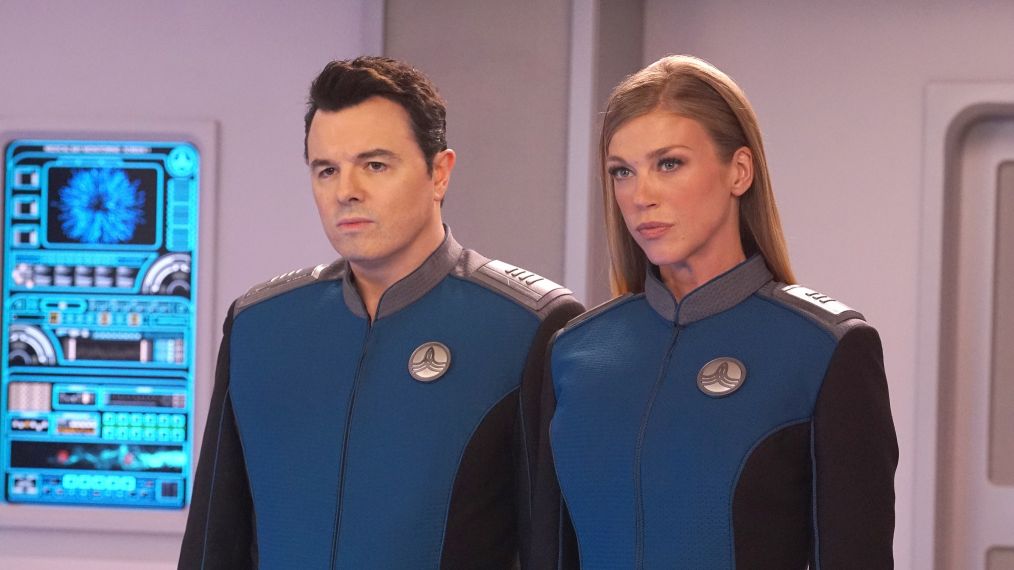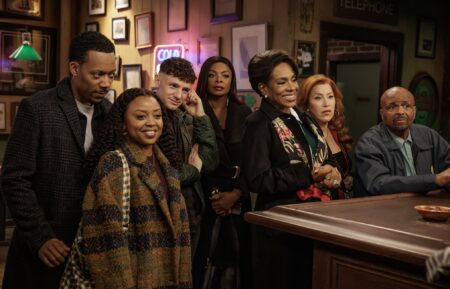Ask Matt: ‘Orville’ Moving to Hulu, ‘Grand Hotel,’ ‘Big Little Lies’ and More

Welcome to the Q&A with TV critic (also known to some TV fans as their “TV therapist”) Matt Roush, who’ll try to address whatever you love, loathe, are confused or frustrated or thrilled by in today’s vast TV landscape. One caution: This is a spoiler-free zone, so we won’t be addressing upcoming storylines here unless it’s already common knowledge.
Please send your questions and comments to [email protected] (or use the form at the end of the column) and follow me on Twitter. Look for Ask Matt columns on most Tuesdays and Fridays.
Is Orville‘s Move to Hulu a Death Blow?
Question: I have read that one of my favorite shows, The Orville, is moving to Hulu for Season 3. And that it’s the show-runners who have decided to move it. Are they nuts? They can come up with as many reasons as they want to justify the move, but I don’t think they really thought about the ramifications. They will certainly lose many viewers. And that’s a shame. There are so many streaming services out there right now and I’m certainly not buying into another one. This move could very possibly kill the show when Hulu sees how many viewers don’t jump to their service to watch it. What were they thinking? — JC
Matt Roush: This surprise announcement triggered quite a bit of mail this week, so today’s column will deal with it in detail. Starting with this angle, that airing on Fox obviously made The Orville available to more viewers than will likely be following it to Hulu. But in today’s very complicated marketplace, it isn’t always all about ratings, and with Hulu and the Fox studio (which produces The Orville) both now controlled by Disney, this is an example of corporate synergy that may also be meant to appease the show’s creator, Seth MacFarlane — who according to The Hollywood Reporter is currently a free agent, his overall deal with the Fox studio having expired. No explanation about production demands is likely to satisfy fans who’d prefer to see the show stay on regular network TV (see next question), and for them, this is quite clearly an unfortunate blow.\
But I’d argue the point that this move could prematurely kill the show. In fact, I see it as the opposite. Because the Fox Entertainment network is no longer attached to the Fox studio, the cost of airing The Orville might become prohibitive, and if Fox had ended up canceling the show after the third season, it might have ended up producing new episodes for Hulu anyway.
Is This the End of Free TV?
Question: I know you’ve never been a big fan of The Orville on Fox, but the show’s warp-speed journey over to Hulu for Season 3 has me very concerned that we may be seeing the beginning of the end of free network TV. It’s one thing to offer a Star Trek: Discovery or a Good Fight spinoff to try to lure eyeballs and wallets to CBS All Access. And prior to this move, several network shows were “saved” by streaming services — Designated Survivor and A.P. Bio among recent examples. But all had already either been specifically created for the pay service or canceled by their respective broadcasters. This is the first time I can recall a hit show leaving an over-the-air free network to find a home where it costs to watch it. And I fear this is only the beginning.
I can foresee a time, not long from now, where any show that hits it even remotely big on traditional TV will migrate over to the new pay-only platform and we’ll be losing most of what’s still good about the old national network TV system. And with NBC, CBS and ABC and Fox (through Disney) now all either with their own services or starting them up soon, I can’t help but wonder if we’re watching the end of the free TV world as we know it. Do you think I’m overreacting or is this a reasonable concern? — Aaron F
Matt Roush: These are provocative observations and questions, and in years to come, it’s possible The Orville move will be seen as a predictive sign of the times. We’re clearly in a transitional period in the TV business when it comes to a show’s viability on traditional broadcast vs. cable/streaming. But when you say “free TV,” keep in mind that nothing is for free in this business, not with production costs being what they are. One reason so many companies are developing their own streaming services for additional revenue streams is because the old-fashioned economic model of an ad-based system has largely fallen apart with the advent of DVRs and other technologies. Companies like NBC-Universal, CBS (possibly merging with Viacom) and Disney-ABC will continue to develop programming for their broadcast outlets for the foreseeable future, and if they become hits (This Is Us, the NCIS franchise, and Grey’s Anatomy remind us it’s still possible), the companies will do whatever’s necessary to sustain them. But looking way down the road, it may be true that more and more TV could be available only by subscription, and as I’ve noted many times before, it’s unclear what or when that tipping point will be for the industry to right itself for the sake of the overwhelmed consumer. It may be sooner than we think.
Question: While part of me understands the behind-the-scenes “explanation” as to why The Orville is moving from Fox (which I don’t have to pay for) to Hulu (which I would have to pay for), I’m not thrilled. I pay an obscene amount for cable, and my cable operator keeps removing content. I pay for Netflix, but that’s because I’ve always paid for Netflix. We have Amazon Prime, but that’s more because of our shopping/shipping habits. Now I’ll need to add Hulu. At some point we’ll re-add CBS All Access. Disney + is a no-brainer. I’m not sure if my wallet can handle this diaspora of content, but I’m also wondering if The Orville‘s departure to its corporate cousin has more to do with the Disney/Fox merger. Disney owns Hulu and 20th Century Fox, so MacFarlane basically works for Disney now and not Fox Broadcasting. — Veronica
Matt Roush: All very true, and to this point, it’s not just broadcast networks but cable/satellite operators that need to be concerned about the proliferation of streaming outlets. (I’m hearing from many people affected these days by current network blackouts over retransmission fees. And I’m currently at the TCA press tour in a hotel that subscribes to DirecTV, so unable to watch live CBS programming.) There’s no way to predict how far this trend will go and how many platforms will eventually exist before we say enough. But it’s clear the frustration is mounting, and the Orville situation is just another example.
Checkout Time for Grand Hotel?
Question: What do you think about the renewal odds of Grand Hotel? — Teri
Matt Roush: It’s really hard to say, especially when it comes to summer replacement programming like this series. The expectations probably aren’t as high as they are for shows during the regular season, but I’m betting ABC was hoping Grand Hotel would hold onto more of the audience from the seemingly compatible guilty pleasure of its hit The Bachelorette. If the audience doesn’t grow as the first season nears its inevitable cliffhanger phase, the prospects might be dim for renewal. Seems to be a toss-up right now.
The Long Wait Between Lies
Question: Did Big Little Lies film the entire 1st, 2nd and maybe 3rd seasons all at once? Little Ziggy (Iain Armitage) is still little, but on Young Sheldon, the actor has grown! (It is the same actor, right?) If so, couldn’t they just do the whole series and not stretch it out? Now I have to wait another year for total resolution? What is HBO’s reasoning? Very frustrating. — Betty
Matt Roush: First off, HBO hasn’t yet committed to a third season of Big Little Lies and current consensus — including from the head of HBO programming this week — is that the somewhat ambiguous ending of Season 2 may very well be the actual endpoint, given the complexity of bringing this all-star cast together. Secondly, Big Little Lies was originally intended to be a limited series with just one season, so when the show’s creators decided to proceed with a sequel, they had to write it first, so no way could this have been filmed consecutively even if they’d wanted. (I’m not sure of the timeline, but it’s possible the growth spurt you’ve perceived in Ziggy/Iain Armitage happened after Lies wrapped production. The character also had significantly less air time this year.) And finally, with many cable series, on premium channels in particular, the wait of a year between seasons is hardly unusual. Big Little Lies took longer than most, in part because of the cast and the time it took to contrive a second season (going beyond the perimeters of Liane Moriarty’s original novel), and if it ever does come back again, the wait will be even longer.
Do the Emmys Ignore Popularity?
Question: In response to the also-ran comment about broadcast television at the Emmys, why not base nominations on audience levels? Some of the nominated shows and performers cannot possibly have significant rating numbers. These smaller shows to me are also-rans because of their lower viewership. What do you think? — Robert
Matt Roush: If the Emmys have any reason to exist, it’s to showcase lesser-known shows of high quality, and the performances within, that deserve a wider audience. The Emmys is intended as a barometer of excellence, not a popularity contest. For that, there’s the People’s Choice Awards, and any show lucky enough to score high ratings tends to reap its own rewards. Sometimes it does seem the Emmy voters punish shows for being successful — I tend to think there’s work being done on Grey’s Anatomy these days, for instance, that’s as deserving of attention as the show earned in its early years when there was less competition. But basing nominations, or really anything (including many times a show’s renewal) on an imperfect ratings system would be disastrous.
That’s all for now—and be aware that for much of the rest of the summer, this column will post less regularly. Thanks as always for reading, and remember that I can’t do this without your participation, so please keep sending questions and comments about TV to [email protected] or shoot me a line on Twitter (@TVGMMattRoush), and you can also submit questions via the handy form below. Please include a first name with your question.

















